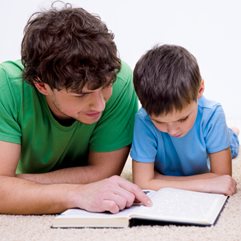Telling Your Child About Your Donation
 If you are a sperm or egg donor, or considering becoming a donor, you may be thinking about how to share your decision with your own children or any you might have in the future.
If you are a sperm or egg donor, or considering becoming a donor, you may be thinking about how to share your decision with your own children or any you might have in the future.
Introduction
Deciding to become a donor shows that you are someone who is generous and altruistic. Your donation is a wonderful gift, enabling others to have the potential to become parents.
If you donated in a UK clinic after the removal of anonymity in 2005, you may have considered the importance of any children born from your donation being able to access your identifying information should they wish, when they become adults. If you donated before anonymity was removed you may have thought about becoming an identifiable donor by re-registering. Contact the HFEA for more information about this.
Why tell
Numerous studies into the well-being of donor conception families state that it’s generally best for donor conceived people to be told about their origins in early childhood. The same is true for donors with their own families. To avoid possible misunderstandings, such as thinking you are someone else’s parent, it is generally beneficial for you to tell your children – both children you have now and any you might have in the future – about your donation.
Sharing information age appropriately in terms of language and the amount of information provided enables parents to be comfortable in telling about their donation and enables their children to explore and gain understanding at their own pace.
When to tell
If you are planning to tell your child or children you may want to consider when and how depending on your child’s age. Here are some examples below:
- When your child’s very young (from birth to preschool age): telling now enables you to find your own words, before your child or children are old enough to question or be confused.
- When your child’s in early childhood (primary school age): telling in small building blocks and simple stories helps you to find a simple way of explaining in your own words.
- When you have an older child (secondary school age and beyond): opportunities could be found - through books, TV programmes, online videos, friends and other family members having babies - to talk about how people sometimes need help from someone else to have a child and that this is a very special and important thing to do.
Telling is not a one off activity. As children get older they think with an ever maturing mind and the questions change accordingly.
How to tell
A simple story works for all ages
‘To make a baby you need an egg from a woman and a sperm from a man. Not all women have eggs so mummy donated some of her eggs to another woman so she could become a mummy.’ ‘Daddy donated some of his sperm to other families so they could have their own children.
This simple sharing opens the door to age appropriate questions with factually correct information and use of language that aids clarity.
The family album approach
Whilst talking to your child about photos in a family album, and sharing how much you (and your partner) wanted to become a family, you can describe the point at which you decided to donate to help someone else become a parent. This works regardless of whether you donated before you became a parent or after. If you donated as part of an egg or sperm sharing programme you can talk about donating at the same time as wanting to have your own family.
A family album recognises the many different ways of parenting; as a genetic parent, step parent, adoptive parent or as a parent who used donor conception themselves later on.
If you are thinking about donating or about re-registering as an identifiable donor you could share your reasons for doing this with your children.
If you have more than one child, it is important to explain to them the difference between their siblings and the children conceived with your assistance.
Being comfortable and open allows your child or children to express their feelings and ask questions. Their thoughts and feelings will change as they get older, but if you continue to be comfortable you are showing that they too can be comfortable with your decisions.
Potential questions your child might ask you
Depending on your child’s age and how interested they are in your reason to donate, your child may ask you a number of questions about your donation. Some of these questions might be difficult to answer.
You may want to think about how to answer questions such as:
- Why did you donate?
- When, where and who did you donate to?
- How many children were born?
- What do you know about the children?
- Will the children look like me?
- What is their relationship to you and to me?
- Will you meet the children in the future?
- Could I potentially meet them in the future?
Find out more
Some of the answers to these questions are personal that only you will be able answer.
However if you want to find out what information you can access about children born from your donation or what information they can access about you please contact:
If you would like counselling support you may want to contact the British Association for Counselling and Psychotherapy or the British Infertility Counselling Association (BICA). Your local GP may also be able to refer you to a counsellor.